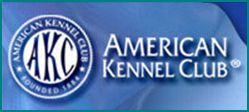|
AKC BreedsWhat is the definition of AKC Breeds? First, AKC stands for American Kennel Club. The American Kennel Club is the country's largest breed registry, issuing the standards that define purebred dog pedigrees in the United States. Pedigree, as defined by Dictionary.com is as an ancestral line; a table or chart recording a line of ancestors of animals. Such a table is used as proof of superior qualities. Although Adopt-the-Right-Dog.com is about adopting the right dog, preferably an unwanted or abandoned dog you find in a shelter, I couldn't build a website about dogs without talking about AKC Breeds. And by the way, did you know that there are purebred dogs that end up in shelters? There are rescue groups dedicated to finding homes for specific breeds. So, if you are interested in a purebred dog, please consider contacting a Breed Rescue Group that can assist you with information about purebred rescue. Don't get me wrong; I love all types of dogs - purebreds too! It's just that most purebreds bred by responsible breeders find good and loving homes, so I always advocate for the mixed breed, mutt, or even the purebred that isn't so forunate to have been born into a home of a responsible dog owner who assures the dog is found an excellent forever home. AKC Breeds photo from the AKC website. According to the AKC, their Mission Statement is as follows: The American Kennel Club is dedicated to upholding the integrity of its Registry, promoting the sport of purebred dogs and breeding for type and function. Founded in 1884, the AKC® and its affiliated organizations advocate for the purebred dog as a family companion, advance canine health and well-being, work to protect the rights of all dog owners and promote responsible dog ownership. The AKC’s Objective: Advance the study, breeding, exhibiting, running and maintenance of purebred dogs.
AKC Breeds by GroupThe AKC recognizes over 150 individual breeds and 162 varieties in all (a variety is a subsection of a breed; for example, the dachshund breed has three varieties: smooth, longhaired, and wirehaired). For that reason it lists seven distinct categories into which all AKC breeds fit: sporting, non-sporting, working, hound, terrier, toy, and herding. There is also a miscellaneous class, which is treated as a temporary stepping stone for newly accepted breeds. Sporting: Members of the Group include pointers, retrievers, setters and spaniels. Remarkable for their instincts in water and woods, many of these breeds actively continue to participate in hunting and other field activities. Hound: Most hounds share the common ancestral trait of being used for hunting. Some use acute scenting powers to follow a trail. Others demonstrate a phenomenal gift of stamina as they relentlessly run down quarry. Beyond this, however, generalizations about hounds are hard to come by, since the Group encompasses quite a diverse lot. Working: Dogs of the Working Group were bred to perform such jobs as guarding property, pulling sleds and performing water rescues. They possess considerable dimensions and strength. Terrier: These are feisty, energetic dog whose sancestors were bred to hunt and kill vermin. Toy: Although diminutive in size, weighing from four to 18 pounds, this group is active, protective and bold. Non-Sporting: The breeds in the Non-Sporting Group are a varied collection in terms of size, coat, personality and overall appearance. Herding: The Herding Group, created in 1983, is the newest AKC classification; its members were formerly members of the Working Group. All breeds share the ability to control the movement of other animals. Miscellaneous Class: Authorities acknowledge that throughout the world there are several hundred distinct breeds of purebred dogs, not all of which are AKC recognized breeds. Those officially recognized for AKC registration appear in the Stud Book of the American Kennel Club. The AKC provides for a regular path of development for a new breed, which may result in that breed’s full recognition and appearance in the official Stud Book as an AKC recognized breed. The breeds currently eligible to participate in the Miscellaneous Class are still enrolled in the AKC Foundation Stock Service®. FSS® enrollment is maintained until the AKC Board of Directors accepts the breed for regular status. For each breed registered by the AKC, a breed standard exists. The "perfect" breed is based on characteristics that include the mental and physical characteristics that allow each breed to perform the function for which they were originated. The standard describes the dog's looks, movement, and temperament. Each breed has a national parent club that Foundation Stock Service® Breeds The American Kennel Club created the Foundation Stock Service® (FSS®) to answer the needs of today's rare breed fanciers. The Foundation Stock Service® is an optional record-keeping service for all purebred breeds not currently registrable with the American Kennel Club. Objects of the AKC from the "Charter and Bylaws of the American Kennel Club, Inc." Objects of the Club shall be to maintain and publish an official stud book, to adopt and enforce uniform rules, regulating and governing purebred dog events, to regulate the conduct of persons, interested in breeding, registering, selling, purchasing, exhibiting, and running purebred dogs to prevent, detect, and punish frauds in connection therewith to protect the interests of its members, to publish an official kennel gazette and generally to do everything to advance the study, breeding, exhibiting, running, and maintenance of purebred dogs. Return from AKC Breeds to Choose the Right Breed
Return from AKC Breeds to Adopt the Right Dog Homepage
|






